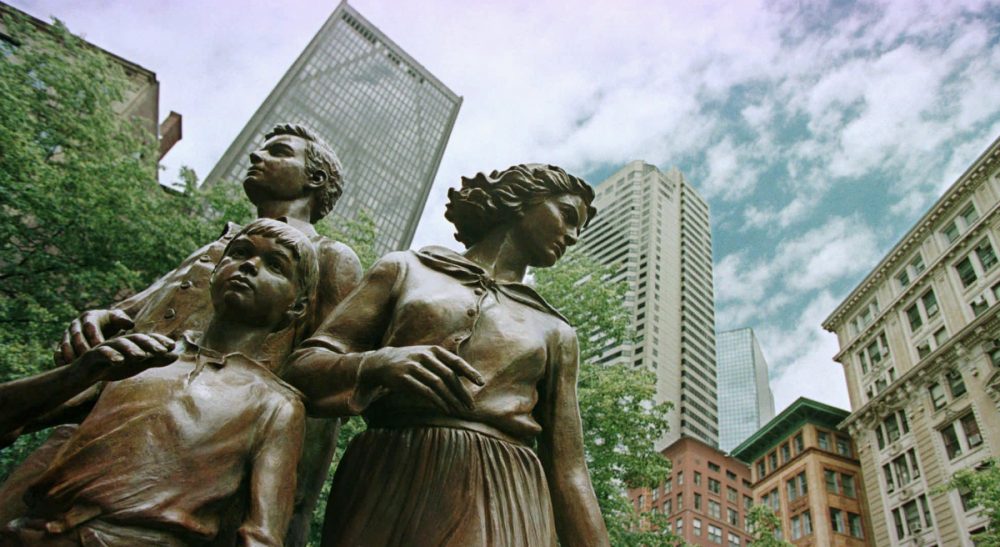Advertisement
In The Anniversary Of A Shipwreck, A Reminder Of The Immigrant Experience

Today, Massachusetts marks the tragic anniversary of the sinking of the ship St. John, which shattered on rocks off the coast of Cohasset in a violent storm in 1849. Ninety-nine of the ship’s passengers, Irish immigrants en route to Boston from County Galway, perished in the frigid and stormy sea. The stone monuments memorializing their deaths — one in Galway, one in Cohasset — stand as twin reminders of the sad fate that has so often befallen those who take the great risk of leaving home for a new world.
...while the immigrant experience has always been characterized by aspirations for a better life, it has also come at the cost of great loss and sacrifice.
The story of the St. John’s passengers — sons and daughters of Galway bound for a new life in Boston — is this year brought into sharp relief by the story of another immigrant family that hailed from the very same place as those lost in the shipwreck: that of Boston Mayor Martin Walsh. Just days before the St. John anniversary, Walsh returned from a trip to Ireland that included a visit to his father’s onetime hometown in Connemara, County Galway. The trip was well received on both sides of the Atlantic. For Bostonians, it was a high-profile version of a story that has become somewhat familiar: The descendant of Irish immigrants, made good in the city of Boston, returns in triumph to the Emerald Isle.
In fact, Walsh’s stop in his father’s hometown was just a few miles from a Galway City park named after another American politician, John F. Kennedy, whose 1963 visit there was cause for wild celebration. This, of course, is the kind of story that Ireland — a small nation uniquely famous for the tens of millions of people across the globe who trace their ancestry to it — knows well, and in which it takes great pride.
Mayor Walsh used his trip as an occasion to speak about the deeply felt connections of diaspora communities to their countries of origin, noting the similarities between his family’s journey and those of the Haitian-American politicians in Boston such as Marie St. Fleur and Linda Dorcena Forry. “People are very proud of them in Haiti.” he said. “When somebody leaves and they do good or their family does good, there’s a tremendous sense of pride.”
The mayor’s trip to Ireland thus gives us cause to acknowledge and celebrate the immigrant roots of our city and nation. More than a century and a half after the wreck of the St. John, it also reminds us that while the immigrant experience has always been characterized by aspirations for a better life, it has also come at the cost of great loss and sacrifice.
The risk that the hopeful who boarded the St. John took, and the fate that befell too many of them, remain real for immigrants from other countries today. The persistence of this reality should remind us that we — all of us in the United States today — are living some version of the dream that so many have died in the attempt to realize for themselves.
As immigrants and descendants of immigrants, we share a timeless bond with all those who still long for the same things that this great country offers, as well as with those who paid the ultimate price in their failed attempts to reach them.
Whether we are speaking about the Irish who took to the sea on a ship 165 years ago, or Haitians and Cubans who have risked everything on makeshift boats and rafts, or a wave of children crossing overland from Central America — they all seek the same destination in the hope that they and their families might one day have the very things that so many of us so often take for granted. This fact can serve as much more than a somber note to temper our sentimentality. It can motivate us to live a life worthy of the tremendous privilege that fortune has bestowed upon us.
As we smile for Mayor Walsh’s visit to a family home, we should also take a moment to think of the lives that have been and continue to be lost in the search of a story like his, a story like ours. As Henry David Thoreau wrote after the wreck of the St. John: “…[they] were coming to the New World, as Columbus and the Pilgrims did — they were within a mile of its shores; but, before they could reach it, they emigrated to a newer world than ever Columbus dreamed of…not merely mariners' tales and some paltry drift-wood and sea-weed, but a continual drift and instinct to all our shores.”
Advertisement
As immigrants and descendants of immigrants, we share a timeless bond with all those who still long for the same things that this great country offers, as well as with those who paid the ultimate price in their failed attempts to reach them.
Editor's note: The author is a Lieutenant Commander in the U. S. Coast Guard. The views expressed in this essay are his alone and not those of the U. S. Coast Guard.
Related:
